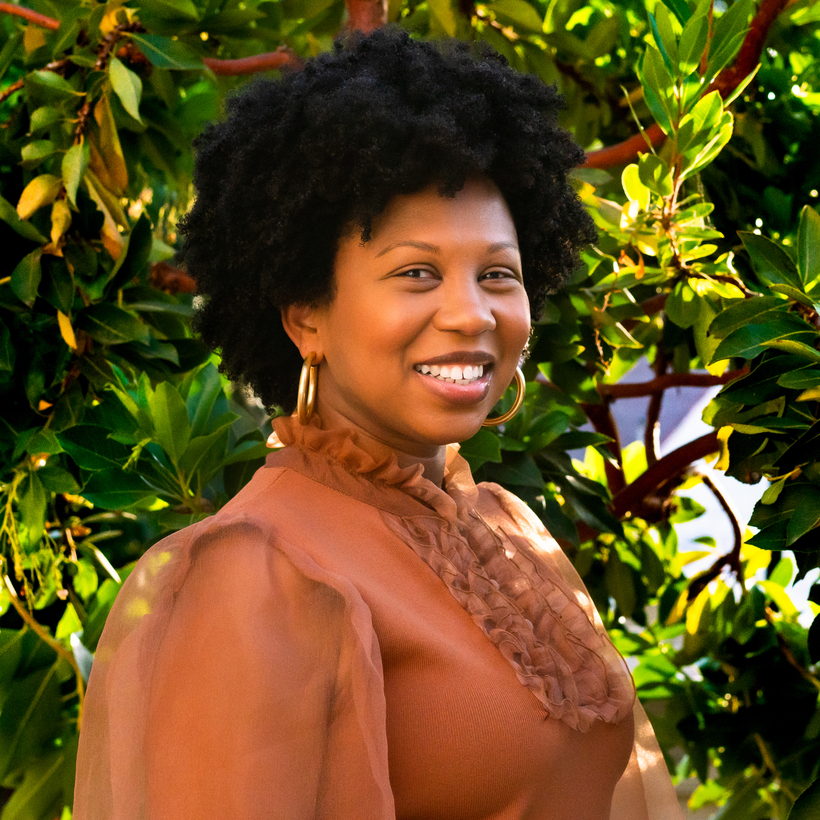Sharing stories is the thread that weaves through Glory Edim’s life. When her mother wanted her to be still to get her hair done, she told her a story. Every day after school Edim went to the library, falling for the words of Zora Neale Hurston, Alice Walker, and Gloria Naylor. It’s why, when preparing her first book, Well-Read Black Girl, she asked lauded Black women writers, including Lynn Nottage, Tayari Jones, and Rebecca Walker, to reflect on the first time they saw themselves in literature.
The book, which collects essays detailing the impact that representation had on the authors’ identity formation and which became a best-seller, grew out of (and took its name from) a nationwide book club she started in 2015. The club also spawned a festival by the same name.
With her second book, Edim, now 39, went back in time. She started flipping through her journals from her angsty early years—entries addled with melodramatic yearning—and decided to curate a collection of stories about the journey from girlhood to womanhood. The result, On Girlhood: 15 Stories from the Well-Read Black Girl Library, publishing next week, collects short stories told from a girl’s point of view, including Toni Morrison’s “Recitatif,” Rita Dove’s “Fifth Sunday,” and Jamaica Kincaid’s “Girl.”
“Girlhood is denied to young Black girls in many ways, and that impacts their sense of belonging,” Edim tells me as she strolls through her Washington, D.C., neighborhood. “I hope anyone can pick up this book and find satisfaction in the stories, but ideally it’s young Black, Brown, and queer people, to give them something to hold on to and be proud of.”
Black girlhood is a unique experience, so often defined by addition and subtraction. Ask any Black woman and she probably has a story about her attempts to add or subtract kinks, curves, and culture. For Edim, books made it easier to do the math and come up with her own formulas.

“When I was reading Nella Larsen and Octavia Butler, it helped me understand my ideology and who I was hoping to become,” Edim says. “When Black girls read the work of their foremothers—and keep reading it until they really understand what they’re saying—it becomes the model for their lives.”
Edim will be reading from On Girlhood at next week’s Well-Read Black Girl Festival, the annual literary festival she founded in 2017.
The festival, which will be held virtually this year, started as a way to provide a fun place for Black women to talk about books. This year it includes special sessions focused on girlhood, including one called “On Rebel Girls & Black Girl Magic,” featuring the editors of Goodnight Stories for Rebel Girls: 100 Real-Life Tales of Black Girl Magic, as well as the session “On Black Motherhood.”
The actress Gabrielle Union is scheduled to be the festival’s first keynote speaker. Union will be reading from her book You Got Anything Stronger?, the follow-up to her memoir, We’re Going to Need More Wine.
Other featured authors have books on the W.R.B.G.-book-club reading list, including Candice Marie Benbow (Red Lip Theology), Honorée Fanonne Jeffers (The Love Songs of W.E.B. Du Bois), and Deesha Philyaw (The Secret Lives of Church Ladies).
The American Booksellers Association has also partnered with Edim, to bring book-club meetings to independent bookstores nationwide to support emerging writers of color.
“That young girl in my journals had a lot of dreams,” Edim says, “but this wasn’t one of them. I could have never ordered my steps to a place where I’m talking to you about my second book. If there are writers that attend my festival and they feel inspired and help other people, that’s success. There’s not a number behind that.”
On Girlhood: 15 Stories from the Well-Read Black Girl Library, by Glory Edim, will be published on October 26. The fifth annual Well-Read Black Girl Festival will be held virtually from October 26 to 30
Kelundra Smith is a theater critic, journalist, and playwright
